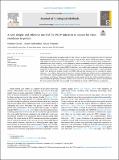A new simple and effective method for PLRV infection to screen for virus resistance in potato
Abstract
Effective screening of plant germplasm collections for resistance to plant viruses requires that there is a rapid and efficient system in place to challenge individual plants with the virus. Potato leafroll virus (PLRV), a commercially important pathogen of potato, is able naturally to infect only the phloem-associated tissue of plants and is delivered to this tissue by feeding aphids. Mechanical (non-vector-mediated) infection by PLRV does not occur thus screening for PLRV resistance is currently laborious and time consuming. We constructed an infectious cDNA clone of a new (Hutton) isolate of PLRV in the binary vector pDIVA and transformed it into Agrobacterium tumefaciens strain LBA4404. Infiltration of this culture into leaves of Nicotiana benthamiana, a highly susceptible model plant, produced a systemic infection with PLRV, although this approach was not successful for potato. However, a very efficient and reproducible systemic infection of potato was achieved when we submerged cut stems of the plant into the agrobacterium cell suspension and then transplanted the stems into compost to grow roots and new apical leaves. Using a standardised protocol developed for this new PLRV inoculation method we have confirmed the previously described resistance to the virus in the JHI breeding line G8107(1) and identified 62 plant accessions from the Commonwealth Potato Collection in which no PLRV infection was detected.
Citation
Cowan , G , MacFarlane , S & Torrance , L 2023 , ' A new simple and effective method for PLRV infection to screen for virus resistance in potato ' , Journal of Virological Methods , vol. 315 , 114691 . https://doi.org/10.1016/j.jviromet.2023.114691
Publication
Journal of Virological Methods
Status
Peer reviewed
ISSN
0166-0934Type
Journal article
Description
Funding: This work was funded by the Scottish Government Rural and Environment Science and Analytical Services Strategic Research Programme 2022–2027 (Project Ref. JHI-B1-1).Collections
Items in the St Andrews Research Repository are protected by copyright, with all rights reserved, unless otherwise indicated.

